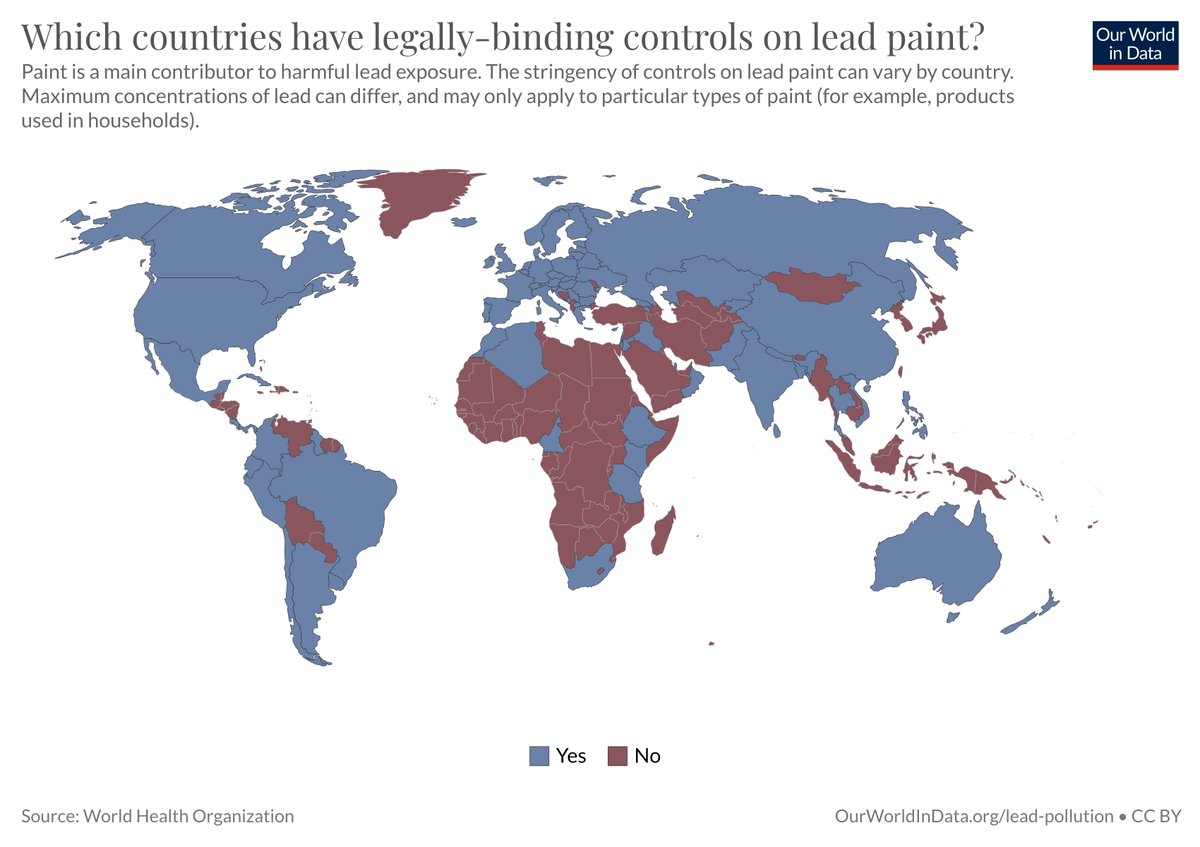Estimates suggest that around 1-in-3 children globally suffer from lead poisoning.
It's a problem that:
– is widespread
– largely invisible & overlooked
– we spend little $$ on
– have large gaps in understanding
Our new @OurWorldInData project 🧵👇
ourworldindata.org/reducing-lead-…
It's a problem that:
– is widespread
– largely invisible & overlooked
– we spend little $$ on
– have large gaps in understanding
Our new @OurWorldInData project 🧵👇
ourworldindata.org/reducing-lead-…

@OurWorldInData Lead is a toxic pollutant. Exposure affects the nervous system, and is linked to delays in brain development & cognitive function.
It's particularly bad for young children.
The IHME estimates that lead pollution is responsible for around 1% of the global disease burden.
1/
It's particularly bad for young children.
The IHME estimates that lead pollution is responsible for around 1% of the global disease burden.
1/

The biggest source of lead used to be from gasoline.
The world has now phased out leaded petrol. A great achievement.
Algeria became the last country to do so, last year.
2/
ourworldindata.org/leaded-gasolin…
The world has now phased out leaded petrol. A great achievement.
Algeria became the last country to do so, last year.
2/
ourworldindata.org/leaded-gasolin…
This led to massive reductions in lead exposure across many countries.
In the US, estimates suggest median blood levels in children have fallen by 95%.
3/
ourworldindata.org/decline-lead-p…
In the US, estimates suggest median blood levels in children have fallen by 95%.
3/
ourworldindata.org/decline-lead-p…

But, large numbers of children are still exposed to high levels of lead in many countries.
Where does this lead come from?
Some sources are easier to identify and tackle than others.
4/
Where does this lead come from?
Some sources are easier to identify and tackle than others.
4/
Many countries have regulatory limits on the use of lead in paints. But many do not. Lead concentrations in paints are very high as a result.
@LeadElimination is one non-profit that is focused on tackling this problem: leadelimination.org
5/
@LeadElimination is one non-profit that is focused on tackling this problem: leadelimination.org
5/

But there are other sources that we know much less about: batteries, electronic waste, even food spices.
This is a big unknown that needs more research on how large these sources are, and how easy they might be to tackle.
6/
This is a big unknown that needs more research on how large these sources are, and how easy they might be to tackle.
6/
Last year the charity evaluator @GiveWell gave its first grant to a lead project.
It stressed that:
– we spend little on this problem
– could be very cost-effective to tackle
– but large uncertainty about the sources of lead & how we tackle them
givewell.org/research/incub…
It stressed that:
– we spend little on this problem
– could be very cost-effective to tackle
– but large uncertainty about the sources of lead & how we tackle them
givewell.org/research/incub…
@GiveWell In our @OurWorldInData work on Lead Pollution we want to make the latest data on this global problem available & accessible.
I have published this here: ourworldindata.org/lead-pollution
/end
I have published this here: ourworldindata.org/lead-pollution
/end

• • •
Missing some Tweet in this thread? You can try to
force a refresh


















